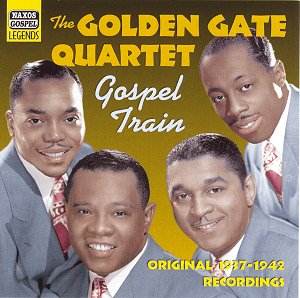 CD Reviews
CD Reviews MusicWeb
Webmaster: Len Mullenger
Len@musicweb.uk.net
[Jazz index][Purchase CDs][ Film MusicWeb][Classical MusicWeb][Gerard Hoffnung][MusicWeb Site Map]

The Golden Gate Quartet
Gospel Train Ė Original 1937-1942 Recordings
![]() Naxos 8.120731 [57:40]
ADD
Naxos 8.120731 [57:40]
ADD
Crotchet Budget price
Golden Gate Gospel Train [2:39]
Gabriel Blows His Horn [2:28]
Preacher and the Bear [2:52]
Take Your Burdens to God [3:20]
To the Rock [2:04]
Noah [2:39]
Traveliní Shoes [1:56]
Iím a Pilgrim [3:17]
Sampson [2:15]
When the Saints Go Marching Home [2:16]
Youíd Better Mind [2:55]
What A Time [2:30]
He Said he Would Calm the Ocean [2:50]
The Valley of Time [2:48]
Jonah in the Whale [2:29]
Anyhow [2:45]
Dip Your Fingers in the Water [2:27]
Blind Barnabas [2:11]
He Never Said A Mumbliní Word [3:23]
Didnít It Rain [2:30]
The Sun Didnít Shine [2:14]
Timeís Winding Up [2:51]Willie Johnson, baritone/leader
Henry Owens, 1st tenor
William Langford 2nd tenor and guitar
Orlandus Wilson, bass vocal
Clyde Riddick, tenor vocal
Abe Green, guitar on "Dip Your Fingers in the Water"
American gospel music became, and has remained, one of the vibrant musical traditions since long before the end of slavery in America in the 1860s. The Negro spiritual and religious gospel music form the basis of jazz, swing, and by extension the roots of the blues, soul music and rock & roll. Thus it is always interesting to listen to early recordings of black American singers, especially as the music often ages remarkably well, sounding fresh decades after it was recorded.
For those unfamiliar with the Golden Gate Quartet, they were the most prominent and successful gospel quartet of the jazz era, and enjoyed success for decades. They were founded in 1934 and continue to perform even today, although the last original member, Orlando Wilson, was forced by poor health to leave in 1998. In their heyday they appeared in several movies, and co-opted the rhythms and stylistic sensibilities of the Mills Brothers and Cab Calloway, among others, updating and refreshing the older Spiritual music and making it their own.
This collection is a sampling of their earliest recorded works, and is one of the more fun romps through gospel music that can be found. The first two recordings, Golden Gate Gospel Train and Gabriel Blows His Horn utilize vocal emulation of trumpets that are so dead-on that it took a reading of the liner notes to find that they were singing unaccompanied on these tracks. The rhythmic complexity on tracks such as Sampson or What A Time is truly remarkable. The sense of humor showed in songs such as Jonah In The Whale displays the talents that this group had as both entertainers and musicians in the era of radio shows, where they had a great amount of experience. One will find themselves impressed time and again with the tightness of these musicians, especially considering that the recording technology of the time would have had to have them recording live, with all four men standing around a single microphone.
The sound fidelity of the recording is very good as well, especially considering the age of the recordings. There are, of course, limitations to the original recordings, and there is only so much that was possible. The listener will hear a lack of high-end fidelity and some noise from the analog equipment. However, anyone expecting a modern studioís digital quality sound from recordings more than 60 years old is simply asking too much. The limitations in these recordings do not distract from the music, and in fact may add to the enjoyment of the vintage music listening experience.
In summation, the lover of vocal music will enjoy this album. It crosses genres sufficiently to appeal to a broad populous of music lovers. The fan of 1940s era music of any kind will find themselves drawn to these recordings. The Golden Gate Quartet is among the best gospel quartets of this or any era, and one that most people would find enjoyable.Patrick Gary